BusinessEurope Headlines No. 2022-22
B7 Summit in Berlin - business recommendations to G7
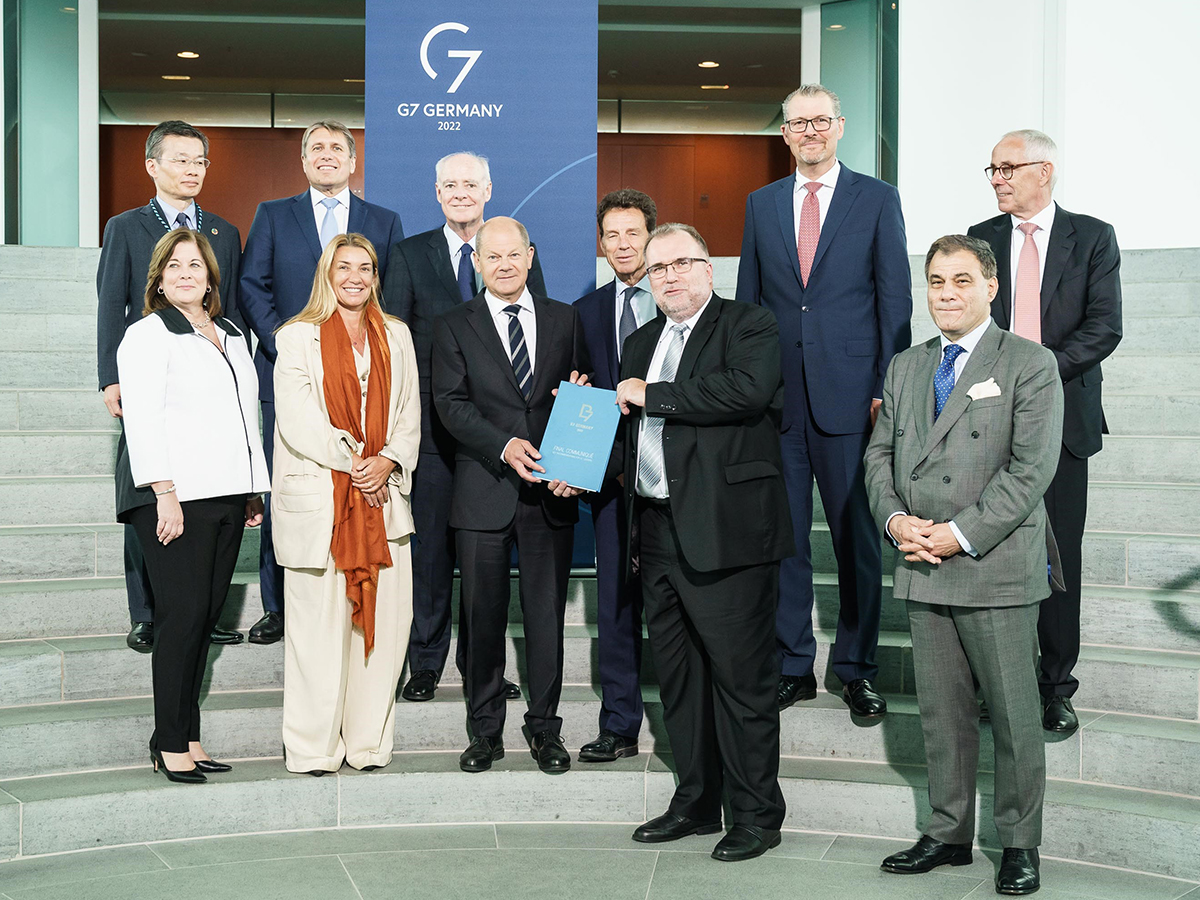
The B7 Summit took place in Berlin on 19 and 20 June, under the leadership of the Federation of German Industries (BDI) in close collaboration with the Confederation of German Employers' Associations (BDA) and the Association of German Chambers of Commerce and Industry (DIHK). Business leaders, among which Markus J. Beyrer, Director General of BusinessEurope, also had the opportunity to meet with German Chancellor Olaf Scholz. This week’s high-level discussions were the culmination of a process that focused on promoting a resilient recovery from the COVID-19 pandemic, also reflecting on the increased geopolitical tensions and the impact it has on global policy. Concrete recommendations to G7 leaders that will meet on 26-28 June at Schloss Elmau, in Germany, were delivered on areas such as: trade and investment, climate and energy, health policy and preparedness for future pandemics, digital policy, infrastructure, labour and education. You may find more information about the B7 process and its key deliverables here. Photo copyright: Bundesregierung | Jesco Denzel
Contacts: Luisa Santos, Sofia Bournou
Video message
Corporate sustainability due diligence: business views
Earlier this year the European Commission published its long-awaited proposal for corporate sustainability due diligence. This is a very important proposal for companies, but the way it is written now leaves a lot of unclarity. Watch our specialists explain why.
India-EU trade and economic relations: discussion with Commerce and Industry Minister
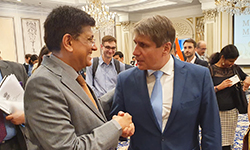 Piyush Goyal, Indian Commerce and Industry Minister, visited Brussels to formally launch the EU-India trade negotiations together with European Commission Executive Vice-President Valdis Dombrovskis on 17 June. Minister Goyal took the occasion to also meet with European business leaders. The meeting was an opportunity for European businesses to have an open and frank exchange with the Minister and discuss the way forward for India-EU trade and economic relations. BusinessEurope Director General Markus J. Beyrer highlighted the EU-India free trade agreement (FTA) as the key priority with India in the coming two years. “An ambitious agreement that covers several areas will be truly beneficial and respond to the current challenges. It will attract more bilateral investment, which will in turn accelerate our digital and green transitions, helping to tackle common challenges such as climate change”, he said. Beyrer added that the FTA will also be part of diversification efforts to reduce overreliances on established trade partners and reduce dependencies. He also mentioned other initiatives recently launched like the Connectivity Partnership and the new EU-India Trade and Technology Council (TTC), which demonstrates the importance that the EU gives to India. While the TTC can be complementary to the FTA, it should not distract our attention from the trade negotiations, Beyrer highlighted. Participants then shared with the Minister the main opportunities and challenges they face when investing and trading with India. The Minister took good note and pointed out India’s commitment to solve those issues to improve trade and investment flows between the EU and India and engage positively in the trade negotiations to finish within a two-year timeline.
Piyush Goyal, Indian Commerce and Industry Minister, visited Brussels to formally launch the EU-India trade negotiations together with European Commission Executive Vice-President Valdis Dombrovskis on 17 June. Minister Goyal took the occasion to also meet with European business leaders. The meeting was an opportunity for European businesses to have an open and frank exchange with the Minister and discuss the way forward for India-EU trade and economic relations. BusinessEurope Director General Markus J. Beyrer highlighted the EU-India free trade agreement (FTA) as the key priority with India in the coming two years. “An ambitious agreement that covers several areas will be truly beneficial and respond to the current challenges. It will attract more bilateral investment, which will in turn accelerate our digital and green transitions, helping to tackle common challenges such as climate change”, he said. Beyrer added that the FTA will also be part of diversification efforts to reduce overreliances on established trade partners and reduce dependencies. He also mentioned other initiatives recently launched like the Connectivity Partnership and the new EU-India Trade and Technology Council (TTC), which demonstrates the importance that the EU gives to India. While the TTC can be complementary to the FTA, it should not distract our attention from the trade negotiations, Beyrer highlighted. Participants then shared with the Minister the main opportunities and challenges they face when investing and trading with India. The Minister took good note and pointed out India’s commitment to solve those issues to improve trade and investment flows between the EU and India and engage positively in the trade negotiations to finish within a two-year timeline.
Contact: Elena Suárez
Building an attractive EU investment environment
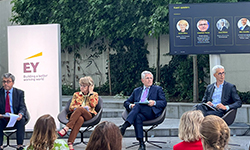 With inflationary pressures rising and government debt levels already high, macroeconomic policymakers have little room for manoeuvre, increasing the need to make the best use of every micro policy lever, to support investment and growth. This was the message of BusinessEurope's Chief Economist James Watson at an event on 21 June to launch EY's 2022 European Attractiveness Survey. Sitting on a panel alongside MEP Danuta Hübner and the European Commission Directorate-General for Taxation and Customs Union Chief, Gerassimos Thomas, James also discussed how an investment friendly tax regime, alongside stronger and deeper banking and capital markets union can also support long-term prosperity.
With inflationary pressures rising and government debt levels already high, macroeconomic policymakers have little room for manoeuvre, increasing the need to make the best use of every micro policy lever, to support investment and growth. This was the message of BusinessEurope's Chief Economist James Watson at an event on 21 June to launch EY's 2022 European Attractiveness Survey. Sitting on a panel alongside MEP Danuta Hübner and the European Commission Directorate-General for Taxation and Customs Union Chief, Gerassimos Thomas, James also discussed how an investment friendly tax regime, alongside stronger and deeper banking and capital markets union can also support long-term prosperity.
Contact: Watson James
Improving legal certainty for businesses, employees and the self-employed in platform work
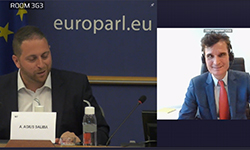 The European Parliament should ensure that the proposal for a directive on improving the working conditions in platform work allows for more flexibility and support for social partners to conclude collective agreements on working conditions in platform work, in line with their national industrial relations practices and social dialogue systems. In this regard, introducing a general rebuttable presumption of employment is the wrong policy orientation at EU level as it is legally and practically unclear, creates negative economic and administrative impacts, and encroaches in diverse labour law solutions and industrial relations practices in the Member States. The key challenge ahead is to improve legal certainty at EU level in a neutral and balanced way for platforms, their employees and self-employed people providing services via online platforms, in particular by establishing clear definitions and creating a balanced and representative set of criteria. These were the key messages presented by Maxime Cerutti, BusinessEurope Director for Social Affairs, during the conference on “Regulating the digital in labour: Platform work and algorithm”, that was organised by the S&D group on 22 June. He added that the final report from the European Parliament should take into account diverse industrial relations systems in the Member States, and the recent national labour laws put in place in a number of Member States to deal with platform work as well as provide clear support for the development of this growing part of the economy, whilst simultaneously ensuring a climate of fair competition with other businesses present on the same market.
The European Parliament should ensure that the proposal for a directive on improving the working conditions in platform work allows for more flexibility and support for social partners to conclude collective agreements on working conditions in platform work, in line with their national industrial relations practices and social dialogue systems. In this regard, introducing a general rebuttable presumption of employment is the wrong policy orientation at EU level as it is legally and practically unclear, creates negative economic and administrative impacts, and encroaches in diverse labour law solutions and industrial relations practices in the Member States. The key challenge ahead is to improve legal certainty at EU level in a neutral and balanced way for platforms, their employees and self-employed people providing services via online platforms, in particular by establishing clear definitions and creating a balanced and representative set of criteria. These were the key messages presented by Maxime Cerutti, BusinessEurope Director for Social Affairs, during the conference on “Regulating the digital in labour: Platform work and algorithm”, that was organised by the S&D group on 22 June. He added that the final report from the European Parliament should take into account diverse industrial relations systems in the Member States, and the recent national labour laws put in place in a number of Member States to deal with platform work as well as provide clear support for the development of this growing part of the economy, whilst simultaneously ensuring a climate of fair competition with other businesses present on the same market.
![]() Contact: Isaline Ossieur
Contact: Isaline Ossieur
Gearing up for the twin transition: capacity building seminar with Turkish social partners
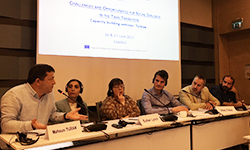 Adapting the labour markets to the twin (digital and green) transitions are clearly some of the key shared priorities for the EU and Turkish social partners. European employers are confronted with growing labour and skills shortages, which lately have been increasingly acting as a bottleneck to economic growth in the EU. Also, a key priority for the European social dialogue going forward is to deal with the important issues of telework and right to disconnect. These were the key messages by Maxime Cerutti, Director for Social Affairs, during a capacity-building jointly organised by the European cross-industry social partners (BusinessEurope, SMEunited, SGI Europe and ETUC) that was held in Istanbul on 16-17 June. This seminar was a useful opportunity to take stock of recent developments in the European social dialogue as well as industrial relations and collective bargaining in Turkey. EU social partners presented the main initiatives they are active on in the context of the European social dialogue. Different sessions - separate employers’ sessions, bipartite exchanges and a series of presentations from external speakers such as International Labour Organisation office for Türkiye or Eurofound shed light on the challenges that the Turkish social partners face in relation to the green and digital transitions as well as the current economic situation in Turkey, especially galloping inflation and the link with wage bargaining. Participants also discussed effective approaches to fostering youth employment, which remains an important priority both at EU level and in Turkey. Both EU and the Turkish social partners agreed that the role of social dialogue is very important in tackling current socio-economic challenges. Social partners are well placed to (co-) develop and (co-) implement tailored solutions, including at the company and sectoral level. Well-designed frameworks are also needed to facilitate social dialogue and collective bargaining at the appropriate levels, in line with diverse national industrial relations practices across the EU and in Turkey.
Adapting the labour markets to the twin (digital and green) transitions are clearly some of the key shared priorities for the EU and Turkish social partners. European employers are confronted with growing labour and skills shortages, which lately have been increasingly acting as a bottleneck to economic growth in the EU. Also, a key priority for the European social dialogue going forward is to deal with the important issues of telework and right to disconnect. These were the key messages by Maxime Cerutti, Director for Social Affairs, during a capacity-building jointly organised by the European cross-industry social partners (BusinessEurope, SMEunited, SGI Europe and ETUC) that was held in Istanbul on 16-17 June. This seminar was a useful opportunity to take stock of recent developments in the European social dialogue as well as industrial relations and collective bargaining in Turkey. EU social partners presented the main initiatives they are active on in the context of the European social dialogue. Different sessions - separate employers’ sessions, bipartite exchanges and a series of presentations from external speakers such as International Labour Organisation office for Türkiye or Eurofound shed light on the challenges that the Turkish social partners face in relation to the green and digital transitions as well as the current economic situation in Turkey, especially galloping inflation and the link with wage bargaining. Participants also discussed effective approaches to fostering youth employment, which remains an important priority both at EU level and in Turkey. Both EU and the Turkish social partners agreed that the role of social dialogue is very important in tackling current socio-economic challenges. Social partners are well placed to (co-) develop and (co-) implement tailored solutions, including at the company and sectoral level. Well-designed frameworks are also needed to facilitate social dialogue and collective bargaining at the appropriate levels, in line with diverse national industrial relations practices across the EU and in Turkey.
Contact: Anna Kwiatkiewicz-Mory
Green transition: an opportunity for SMEs?
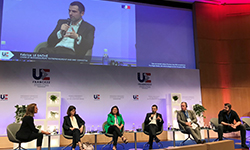 BusinessEurope is committed to the transition to a climate-neutral economy by mid-century and European industry is ready to take its share of responsibility and to bring solutions. The transition is expected to have positive effects such as growing markets for clean technologies, but to shift towards sustainable business models, we need to have certainty that the often-substantial investments associated with such shift will pay off in the long term. And this is particularly true for SMEs. This was one of the key messages highlighted by the Chair of BusinessEurope’s Entrepreneurship and SME Committee, Fabrice Le Saché, during the high-level conference “The Single Market, the natural playground for European SMEs”, organised by the French EU Presidency in Paris on 21 June. “In order to make sustainable business models work in the long-term, and to be competitive, we must avoid SMEs and other European leaders being undercut by unfair competition from overseas. While most SMEs for the moment are not directly part of the Emissions Trading System (ETS), they nevertheless bear the carbon costs via higher prices for electricity and raw materials”, Le Saché added. It's also key that the impact of existing and incoming legislations, notably in the field of sustainability reporting, is properly assessed and that at EU level the regulatory framework is carefully designed to avoid excessive burden on SMEs. In the margins of the conference, BusinessEurope participated in a meeting of the SME Envoy Network with the European Commission, Member States’ representatives and business associations focusing on the impact of sanctions and high energy costs on European SMEs.
BusinessEurope is committed to the transition to a climate-neutral economy by mid-century and European industry is ready to take its share of responsibility and to bring solutions. The transition is expected to have positive effects such as growing markets for clean technologies, but to shift towards sustainable business models, we need to have certainty that the often-substantial investments associated with such shift will pay off in the long term. And this is particularly true for SMEs. This was one of the key messages highlighted by the Chair of BusinessEurope’s Entrepreneurship and SME Committee, Fabrice Le Saché, during the high-level conference “The Single Market, the natural playground for European SMEs”, organised by the French EU Presidency in Paris on 21 June. “In order to make sustainable business models work in the long-term, and to be competitive, we must avoid SMEs and other European leaders being undercut by unfair competition from overseas. While most SMEs for the moment are not directly part of the Emissions Trading System (ETS), they nevertheless bear the carbon costs via higher prices for electricity and raw materials”, Le Saché added. It's also key that the impact of existing and incoming legislations, notably in the field of sustainability reporting, is properly assessed and that at EU level the regulatory framework is carefully designed to avoid excessive burden on SMEs. In the margins of the conference, BusinessEurope participated in a meeting of the SME Envoy Network with the European Commission, Member States’ representatives and business associations focusing on the impact of sanctions and high energy costs on European SMEs.
Contact: Daniele Olivieri
Business calls for further regulation of private litigation funding in Europe
 Third party litigation funding (TPLF) is an estimated €40 to €80 billion market globally. This business model which introduces a profit-motivated element into the traditional attorney-client relationship is growing exponentially in Europe. There are more than 100 litigation funders operating on our continent, yet TPLF is largely unregulated in the EU, unlike other financial and legal commercial activities. Thirteen business and trade associations (including BusinessEurope) call on European policymakers to address this growing financial industry with sensible safeguards for effective oversight which will ultimately prevent a frivolous litigation culture to emerge in Europe. The cos-signatories expressed support for the efforts in the European Parliament’s Committee on Legal Affairs (JURI) in preparing a Parliament resolution on responsible private funding of litigation.
Third party litigation funding (TPLF) is an estimated €40 to €80 billion market globally. This business model which introduces a profit-motivated element into the traditional attorney-client relationship is growing exponentially in Europe. There are more than 100 litigation funders operating on our continent, yet TPLF is largely unregulated in the EU, unlike other financial and legal commercial activities. Thirteen business and trade associations (including BusinessEurope) call on European policymakers to address this growing financial industry with sensible safeguards for effective oversight which will ultimately prevent a frivolous litigation culture to emerge in Europe. The cos-signatories expressed support for the efforts in the European Parliament’s Committee on Legal Affairs (JURI) in preparing a Parliament resolution on responsible private funding of litigation.
![]() Contact: Oliveira Pedro
Contact: Oliveira Pedro
Diversifying supply chains: is India attractive?
 Participating at a panel discussion of the India Trilateral Forum on 14 June, Elena Suárez, Senior Advisor at BusinessEurope highlighted that companies are looking at India with interest when considering their diversification efforts to reduce overreliances on established trade partners and reduce dependencies. Organised by the German Marshal Fund of the United States in Stockholm in cooperation with the Swedish Ministry of Foreign Affairs, the event tackled companies’ options and views on India as businesses consider diversifying their supply chains to new destinations in Asia or moving to a China+1 model. Participants also discussed what are the push and pull factors of doing business in and with India. Suárez stated that while there is a lot of momentum for India, other countries in the region will also be competing to attract investments. She emphasised the importance for India to create the right conditions to be attractive. These include improving the conditions on the ground at Indian State level; continuing with the green transition and investments in renewables so that companies can have access to green energy; adopting international standards to allow interoperability and economies of scale; and concluding an ambitious and comprehensive free trade agreement with the EU that will be the main platform to solve existing trade barriers and be the bedrock of the future economic relationship.
Participating at a panel discussion of the India Trilateral Forum on 14 June, Elena Suárez, Senior Advisor at BusinessEurope highlighted that companies are looking at India with interest when considering their diversification efforts to reduce overreliances on established trade partners and reduce dependencies. Organised by the German Marshal Fund of the United States in Stockholm in cooperation with the Swedish Ministry of Foreign Affairs, the event tackled companies’ options and views on India as businesses consider diversifying their supply chains to new destinations in Asia or moving to a China+1 model. Participants also discussed what are the push and pull factors of doing business in and with India. Suárez stated that while there is a lot of momentum for India, other countries in the region will also be competing to attract investments. She emphasised the importance for India to create the right conditions to be attractive. These include improving the conditions on the ground at Indian State level; continuing with the green transition and investments in renewables so that companies can have access to green energy; adopting international standards to allow interoperability and economies of scale; and concluding an ambitious and comprehensive free trade agreement with the EU that will be the main platform to solve existing trade barriers and be the bedrock of the future economic relationship.
Contact: Elena Suárez
Algeria’s discriminatory measures against Spain: BusinessEurope voices concern
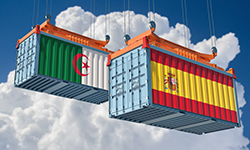 BusinessEurope sent a letter concerning the recent tensions between Algeria and Spain to European Commission Executive Vice-President Valdis Dombrovskis on 21 June. In the letter, Markus J. Beyrer, Director General of BusinessEurope, voices his concern about the Algerian government’s instruction to financial institutions in the country to freeze all transactions with Spain. The letter also highlights that these actions, which have effectively halted much of the trade between Spain and Algeria, are in violation of the EU-Algeria Association Agreement and negatively affect Spanish companies across sectors. BusinessEurope condemns the arbitrary measures taken by the Algerian government and calls for a rapid resolution of the crisis, welcoming the discussions between the EU and Algeria to this end.
BusinessEurope sent a letter concerning the recent tensions between Algeria and Spain to European Commission Executive Vice-President Valdis Dombrovskis on 21 June. In the letter, Markus J. Beyrer, Director General of BusinessEurope, voices his concern about the Algerian government’s instruction to financial institutions in the country to freeze all transactions with Spain. The letter also highlights that these actions, which have effectively halted much of the trade between Spain and Algeria, are in violation of the EU-Algeria Association Agreement and negatively affect Spanish companies across sectors. BusinessEurope condemns the arbitrary measures taken by the Algerian government and calls for a rapid resolution of the crisis, welcoming the discussions between the EU and Algeria to this end.
![]() Contact: Benedikt Wiedenhofer
Contact: Benedikt Wiedenhofer
Forced labour: input to the European Commission ahead of legislation
 The European Commission – Directorates General for Trade and for Internal Market, Entrepreneurship and SMEs – is currently preparing a legislative initiative on “effective ban of products produced, extracted or harvested with forced labour”, which is scheduled to be published in mid-September. In this regard, a “Call for Evidence” process was opened until 20 June. BusinessEurope provided initial input in this context, which focused on the following key points: the European business community fully condemns and rejects forced labour. This is a serious human rights violation. We recognise the efforts that have been taken so far by the European Commission, the EU Member States, international organisations and the broader civil society, including business, to address these challenges, and we believe that the best way to effectively address forced labour is through a multistakeholder, multidisciplinary approach. Companies are increasing their efforts to address issues in their supply chains, both at company level, as well as through sectoral schemes. For instance, through public-private partnerships. As a next step, further discussions will be launched with our members, in preparation of a comprehensive BusinessEurope position paper in autumn, after the European Commission publishes their proposal.
The European Commission – Directorates General for Trade and for Internal Market, Entrepreneurship and SMEs – is currently preparing a legislative initiative on “effective ban of products produced, extracted or harvested with forced labour”, which is scheduled to be published in mid-September. In this regard, a “Call for Evidence” process was opened until 20 June. BusinessEurope provided initial input in this context, which focused on the following key points: the European business community fully condemns and rejects forced labour. This is a serious human rights violation. We recognise the efforts that have been taken so far by the European Commission, the EU Member States, international organisations and the broader civil society, including business, to address these challenges, and we believe that the best way to effectively address forced labour is through a multistakeholder, multidisciplinary approach. Companies are increasing their efforts to address issues in their supply chains, both at company level, as well as through sectoral schemes. For instance, through public-private partnerships. As a next step, further discussions will be launched with our members, in preparation of a comprehensive BusinessEurope position paper in autumn, after the European Commission publishes their proposal.
![]() Contact: Martynas Barysas, Sofia Bournou
Contact: Martynas Barysas, Sofia Bournou
Calendar 
- 26-28 June: G7 Germany 2022
- 27-29 June: Conference on Industrial Technologies IndTech 2022
- 28-30 June: Connecting Europe Days
- 30 June: BusinessEurope event: Chemicals regulation - from European industry to society
- 1 July: BusinessEurope event: Morning Talks on International Issues No.5
Not yet a subscriber? Register here.
Reminder: please have a look at our privacy policy